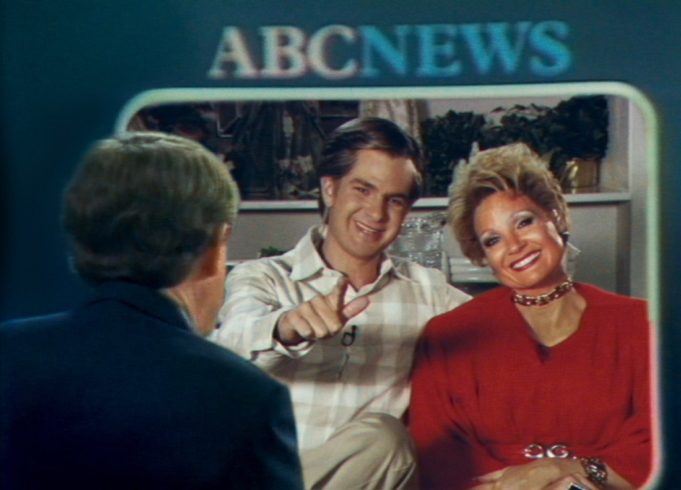When Jim Bakker was convicted on 24 counts of defrauding his investors at PTL Ministries in 1989, his wife and frequent TV host Tammy Faye Bakker sang a hymn at the press conference immediately afterwards and told reporters, “It ain’t over till it’s over.”
On his Tonight Show monologue, Johnny Carson fired back, “But it is over! The fat lady sang!”
The Eyes of Tammy Faye would like us to consider whether we all gave her a bad rap. If you weren’t around back then, the PTL scandal (PTL standing for “Praise the Lord”) was to evangelical Christians what the pedophile priest scandal would be to Catholics a generation later. The Bakkers’ church built America’s fourth largest TV network at the time, and when it all turned out to be a Ponzi scheme about God, everyone who didn’t share their beliefs had a perfect occasion to point at evangelicals and laugh. Tammy Faye was a particularly easy target, with her slathered-on makeup, weepy on-camera histrionics, well-publicized drug overdose, and sybaritic lifestyle signified by her purchase of an air-conditioned doghouse with church donations. Even for some of the Bakkers’ followers, she was proof that women had no place as church leaders.
Being ridiculous in public is no crime, but financial fraud certainly is. Tammy Bakker was the heavily mascara’d public face who convinced millions to hand over their money to real estate projects that were never going to be built, even if some combination of drugs and disinterest in business details meant that she didn’t understand the full extent of the shenanigans. Yes, she supported and welcomed LGBT people during the height of the AIDS crisis, and she was definitely less malignant than some of the men around her. Still, she continued to defend Jim even after his malfeasance became public. In the end, this movie doesn’t quite convince me that we need to reevaluate her. It is watchable, though.
The main story picks up at a Bible college in Minneapolis in 1960, where Jim (Andrew Garfield) is a brash young student who cites John 10:10 as proof that God does not want us to be poor. This is music to the ears of Tammy Faye LaValley (Jessica Chastain), who hails from a devout but destitute family in nearby International Falls. They marry, and Jim creates and hosts The 700 Club for the fledgling Christian Broadcasting Network until the Rev. Pat Robertson (Gabriel Olds) steals away the show and the credit. Undaunted, the Bakkers take what they’ve learned and create their own TV show based in Charlotte, which becomes a national network and then an empire that includes a theme park and hotels.
The film is adapted from a similarly titled 2000 documentary by Fenton Bailey and Randy Barbato, made when Tammy Faye was still alive and going by her new married surname of Messner. Michael Showalter is quite the hit-or-miss director: When he has a strong script (The Big Sick), he doesn’t screw it up, but when his material is lacking (The Lovebirds), he can’t save it. This film is closer to the former than the latter. He sticks relentlessly to Tammy Faye’s point of view, so that when Jim reveals PTL’s financial troubles and his affair with the never-named Jessica Hahn, the news blindsides us as well as her.
There’s enlightening material, too, on the generation of tuned-in Christians who first used TV and the culture they created. When Tammy insists on sitting at a dinner table with the male ministers instead of the one with their wives, the Rev. Jerry Falwell (Vincent D’Onofrio) says, “She’s a firecracker, Jim,” in a tone that’s clearly not complimentary. The Bakkers aren’t culture warriors, but tellingly, their rhetoric becomes more militant when PTL goes into debt. They go on TV raising alarms about enemies who want to destroy the church, and their followers call in with their wallets open.
Still, more disciplined filmmakers might have observed how the Bakkers’ tacky materialism (which was gawked at and judged by many Christians back them) became mainstream in today’s evangelical Christianity. Tammy’s viewpoint prevents them from taking in the considerable amounts of misogyny, hypocrisy, and fattism that went into the mockery she received back then. Nor are we given much insight into why people confused the Bakkers’ gaudy riches with virtue, or how many of those same followers embraced Donald Trump’s presidency when by all rights they should have spurned him. The film ends with Tammy singing at Oral Roberts University in the 1990s after several years away from the church, and I have no idea what it’s trying to say here. Are we supposed to take Tammy’s version of Christianity as irreducibly cheap? Is her brand of religion the same as American Christianity? Or maybe she’s a creature who could only exist in this country? Or maybe that Christians, like the rest of us, are helpless in the face of a good show? The writing is unfocused.
Not so with Chastain, who expertly imitates the real-life subject’s mannerisms, her infantilized Midwestern drawl, her short-armed fist pumping, her singing, her puppet shows aimed at kids. This is flashy, but I’m more impressed by the low-key work she puts in playing Bakker as a woman scarred by poverty, saddled with a mother (Cherry Jones) who steadfastly refuses to be impressed with her, and medicating herself with the trappings of wealth, plus large amounts of Ativan and Diet Coke. Opposite her, Garfield plays Jim as a monster of self-pity who overextends his business empire and blames everyone but himself when things go wrong, a man who first sees his newborn son and immediately asks Tammy why her music producer (Mark Wystrach) was the one who drove her to the hospital. When the scandal breaks and all their issues come to a head in their Charlotte mansion, the two deliver all the fireworks you’d want. Where The Eyes of Tammy Faye fails to tell us anything new about its subject, its lead actors make us feel like we understand them better.
The Eyes of Tammy Faye
Starring Jessica Chastain and Andrew Garfield. Directed by Michael Showalter. Written by Abe Sylvia, based on Fenton Bailey and Randy Barbato’s documentary. Rated PG-13.












